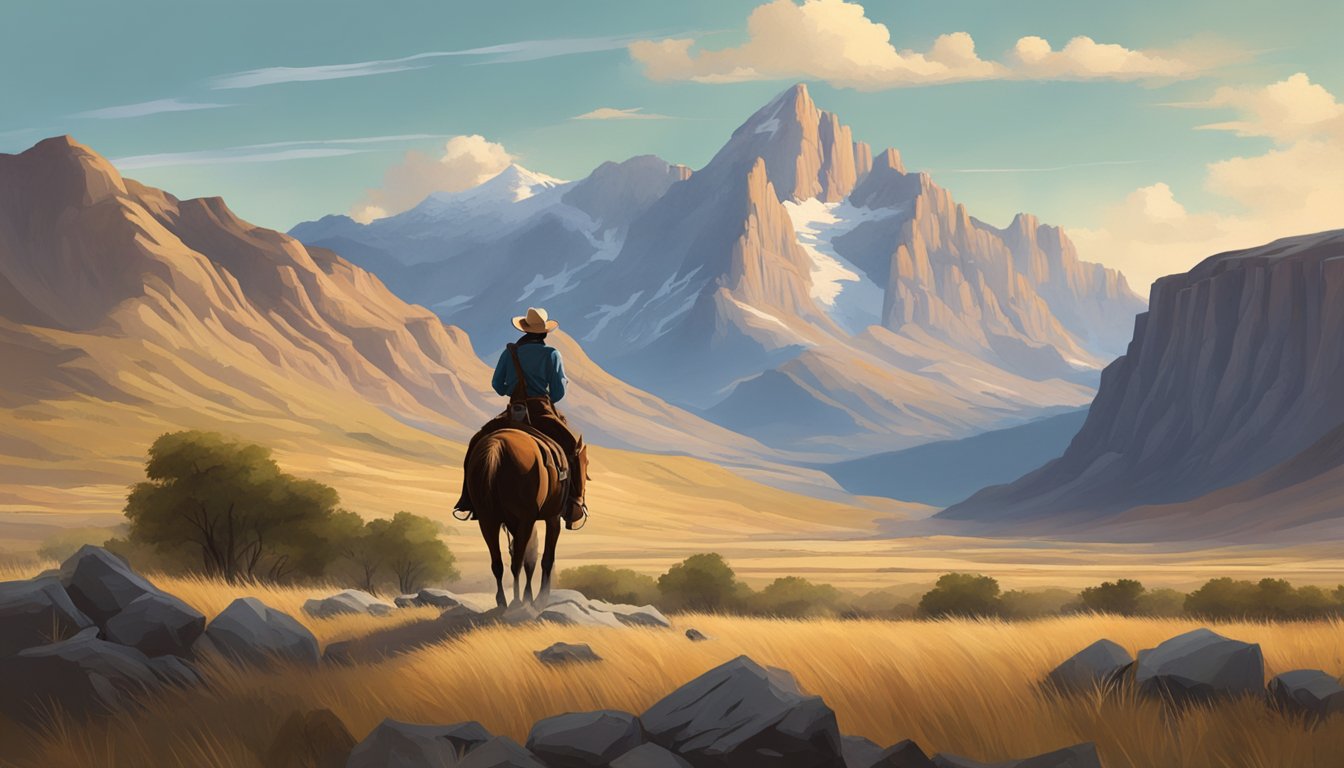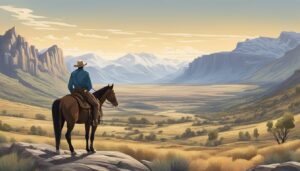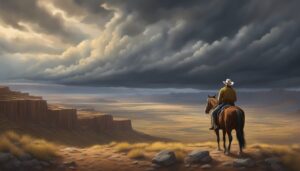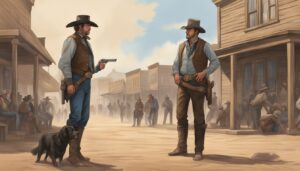Western heroes have captivated audiences for generations, embodying ideals of rugged individualism and frontier justice. Two iconic figures stand out in this genre: John Dutton from the modern TV series Yellowstone and Shane from the classic 1953 film of the same name. Both characters represent different eras and styles of Western storytelling, yet they share certain qualities that make them compelling protagonists.
John Dutton, portrayed by Kevin Costner in Yellowstone, is a contemporary rancher fighting to protect his family’s legacy in Montana. He faces challenges from developers, Native American tribes, and his own children in a complex web of modern conflicts. Shane, played by Alan Ladd, is a mysterious gunfighter who arrives to help homesteaders against a ruthless cattle baron in 19th-century Wyoming. While both characters are formidable in their own right, Shane’s mythic status and lasting impact on the Western genre make him the more impressive Western hero.
The comparison between John Dutton and Shane highlights the evolution of the Western genre. Yellowstone, along with its prequels 1883 and 1923, brings the Western into the 21st century, addressing current issues while maintaining traditional themes. Shane, on the other hand, represents the classic Western, setting the standard for the lone gunfighter archetype that has influenced countless stories since.
John Dutton: Patriarch of Yellowstone
John Dutton stands as the formidable center of the Yellowstone universe. His complex character embodies the struggle to preserve a family legacy against modern threats.
Character Background and Development
John Dutton, portrayed by Kevin Costner, is the rugged patriarch of the Dutton family. Born and raised in Montana, he’s estimated to be around 60 years old. John’s character is defined by his unwavering commitment to the Yellowstone Ranch and his family’s heritage.
His development throughout the series reveals a man grappling with changing times. John’s tough exterior often masks inner turmoil as he fights to maintain control over his vast empire. His memorable one-liners showcase his no-nonsense approach to life and business.
Dutton Family Dynamics
The Dutton family tree is complex and often tumultuous. John’s relationships with his children – Beth, Kayce, and Jamie – form a central part of the series’ drama. Each child brings unique challenges to John’s leadership.
Beth, the fierce and loyal daughter, often aligns most closely with John’s interests. Kayce struggles between his loyalty to the ranch and his own family with Monica and Tate. Jamie’s relationship with John is perhaps the most strained, filled with conflict and mistrust.
Rip Wheeler, though not a blood relative, has become an integral part of the Dutton family dynamic, serving as John’s right-hand man and eventual son-in-law.
Yellowstone Ranch: A Legacy in Montana
The Yellowstone Ranch, spanning thousands of acres in Montana, is more than just land to John Dutton – it’s his family’s legacy. The ranch has been in the Dutton family for over five generations, dating back to the events depicted in the prequel series “1883”.
John’s fight to preserve the ranch against developers, land grabbers, and changing economic realities forms the core conflict of the series. His methods often blur ethical lines, showcasing the lengths he’ll go to protect his inheritance.
The ranch itself becomes a character, embodying the ideals of the American West that John strives to maintain. It represents not just a way of life, but a connection to history and family that John refuses to relinquish.
Shane: The Mysterious Gunslinger

Shane embodies the archetypal Western hero – a man of few words with a shadowy past and unmatched skill with a gun. His enigmatic nature and complex morality add depth to his character, making him a compelling figure in Western cinema.
The Enigmatic Character of Shane
Shane arrives as a lone drifter, his origins and motives unclear. His quiet demeanor and reluctance to discuss his past create an aura of mystery. Shane’s expert gunmanship hints at a violent history he’s trying to leave behind.
He forms a bond with the Starrett family, especially young Joey, who idolizes him. Shane’s interactions reveal a gentle side at odds with his deadly skills. His internal struggle becomes apparent as he tries to resist reverting to his gunfighter ways.
Shane’s attire – buckskins and a distinctive hat – sets him apart visually. His cool composure in the face of threats further emphasizes his enigmatic nature.
Moral Ambiguity and Complexity
Shane wrestles with the morality of violence throughout the film. He initially resists using force, enduring humiliation from the antagonists. This restraint highlights his desire to reform and live peacefully.
However, Shane ultimately concludes that violence is necessary to protect the homesteaders. This decision is not made lightly, reflecting the moral complexity of his character.
Shane’s final confrontation with the villains is brutal and efficient, showcasing his lethal abilities. Yet he remains a sympathetic figure due to his reluctance to fight and his selfless motives.
In the end, Shane rides away alone, unable to fully integrate into peaceful society. This bittersweet conclusion underscores the moral ambiguity of his actions and character.
Cultural and Political Influence

John Dutton and Shane both wield significant cultural and political influence in their respective settings. Their interactions with local communities and power structures shape the narratives of their stories.
The Duttons’ Relationship with Native Americans
John Dutton’s complex relationship with the Broken Rock Indian Reservation adds depth to Yellowstone’s portrayal of modern Western conflicts. Chief Thomas Rainwater serves as both an adversary and occasional ally to the Duttons. Their interactions highlight ongoing tensions over land rights and cultural preservation.
The show explores historical injustices faced by Native Americans while depicting their current struggles. Dutton’s efforts to maintain control of his ranch often clash with the tribe’s interests, leading to political maneuvering and uneasy alliances.
Power Dynamics and Political Power
John Dutton’s political influence extends far beyond his ranch. As a wealthy landowner, he leverages his connections to shape local and state politics. His methods often blur ethical lines, showcasing the complex power dynamics in rural America.
Shane, in contrast, influences his community through more direct action. His arrival disrupts existing power structures, challenging local authority figures. While Shane’s impact is more localized, it resonates deeply within his small Wyoming town.
Both characters embody different aspects of the mythical Western hero, wielding their influence to protect what they value most. Their actions reflect broader themes of justice, loyalty, and the changing face of the American West.
Themes and Storytelling
John Dutton and Shane navigate complex moral landscapes in their respective neo-Western narratives. Their stories explore family dynamics, violence, and ethical quandaries against distinct backdrops.
Depiction of the Modern Western Drama
Yellowstone portrays a contemporary Western world where John Dutton fights to preserve his family’s legacy. The show weaves intricate family relationships with political and corporate conflicts. Dutton’s struggles reflect modern challenges to traditional ranching lifestyles.
Shane, set in the 1870s, focuses on classic Western themes of good versus evil. The titular character becomes entangled in a conflict between homesteaders and cattle ranchers. This simpler narrative contrasts with Yellowstone’s complex web of alliances and betrayals.
Both stories use the Western setting to examine human nature and societal change. Yellowstone adds layers of corporate intrigue and political maneuvering to update the genre.
Graphic Depictions and Moral Dilemmas
Yellowstone doesn’t shy away from brutal violence, mirroring films like Sicario in its unflinching portrayal of conflict. The show presents morally gray situations where characters make difficult choices to protect their interests.
John Dutton often uses questionable methods to defend his ranch, blurring the line between justice and vengeance. This complexity adds depth to his character and the overall narrative.
Shane’s violence is more straightforward, typical of classic Westerns. The protagonist reluctantly uses force to protect the weak from clear antagonists. While Shane grapples with his violent past, his moral compass remains relatively steady.
Both narratives use violence as a storytelling tool, but Yellowstone embraces moral ambiguity to a greater degree. This approach creates a more nuanced exploration of right and wrong in the modern West.
Character Analysis and Comparisons

John Dutton and Shane represent contrasting archetypes in the Western genre. Their character development and motivations shape their roles as complex figures that resonate with audiences in different ways.
John Dutton as the Antihero
John Dutton embodies the modern antihero in Yellowstone. As the patriarch of the Dutton family, he fiercely protects his ranch and legacy through morally ambiguous means. His character is marked by ruthlessness and a willingness to bend rules to achieve his goals.
John’s complexity stems from his devotion to family and land, which often clashes with his brutal decision-making. This internal conflict drives much of the show’s tension and character development.
Despite his questionable actions, John’s loyalty and determination make him a compelling figure. His struggle to maintain power and preserve his way of life in a changing world adds depth to his character.
Shane’s Role as a Resonating Figure
Shane, the titular character of the 1953 film, represents a more traditional Western hero. As a mysterious gunfighter, Shane arrives to help a homesteading family and becomes embroiled in their conflict with a cattle baron.
Shane’s character arc revolves around his attempts to leave his violent past behind. His bond with the Starrett family, especially young Joey, showcases his softer side and desire for a peaceful life.
Unlike John Dutton, Shane embodies classic heroic virtues of self-sacrifice and protecting the innocent. His internal struggle between violence and redemption creates a poignant narrative that has resonated with audiences for decades.
Impact on the Western Genre

Yellowstone and Shane have significantly shaped the Western genre in different eras. Their influence extends to storytelling techniques, character portrayals, and audience expectations.
Yellowstone and its Influence on Modern TV
Yellowstone has revitalized the Western genre for contemporary audiences. The show blends classic Western elements with modern themes, attracting a new generation of viewers. It tackles issues like land rights, political corruption, and family dynamics in a 21st-century context.
The Dutton family saga has spawned multiple spinoffs, expanding the Yellowstone universe. This franchise approach has redefined how Western stories are told on television. Paramount+ has leveraged the show’s popularity to create a streaming powerhouse.
Season 5’s success demonstrates the enduring appeal of well-crafted Western narratives. The season finale left fans eager for more, showcasing the genre’s potential for sustained engagement.
Critical Reception and Audience Perception
Critics have praised Yellowstone for its fresh take on Western tropes. The show’s complex characters and morally ambiguous storylines have garnered acclaim. Audiences have responded positively to the series’ nuanced portrayal of modern ranch life.
John Dutton’s character has become a cultural touchstone, sparking debates about power and legacy. The show’s exploration of family dynamics resonates with viewers across demographics.
Yellowstone’s success has paved the way for more diverse Western narratives on TV. It has proven that the genre can adapt to changing societal norms while retaining its core appeal.



